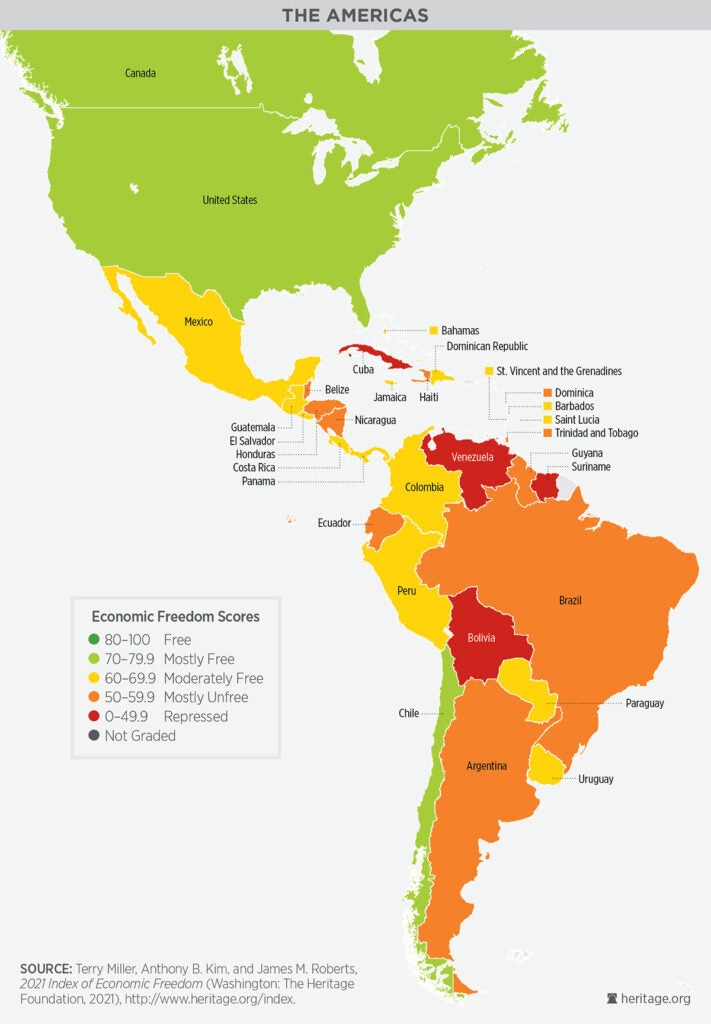The lack of economic freedom in the countries of the Northern Triangle—Honduras, Guatemala, and El Salvador—has long been a consistent push factor of illegal immigration to the north. It did not suddenly cause the 2021 U.S. border crisis, and resolving it requires serious, lasting solutions.
There are a great number of interwoven factors behind why tens of thousands of people have fled their home countries in the triangle region, risking everything on a perilous journey through Mexico to the U.S. border.
Yet that tragic humanitarian flow of illegal migration from the region fundamentally stems from the pervasive economic governance failures, often exacerbated by political instability, that have long beleaguered people in the region with the grave lack of economic opportunities.
Honduras, Guatemala, and El Salvador are underdeveloped, poor, and violent due to the severe institutional shortcomings that have long undermined economic freedom there. Corrupted and ineffective economic governance has long beset people’s livelihoods measurably in those countries.
For example, on all of the rule of law pillars of The Heritage Foundation’s annual Index of Economic Freedom—which encompasses property rights, judicial effectiveness, and government integrity—the three countries in northern Central America lag well behind even their Latin American and Caribbean peers on average, let alone many other countries around the world.
Those institutional deficiencies, aggravated by other problems related to regulatory efficiency and market openness, are undeniably leading factors that undercut the overall economic freedom and much-needed meaningful long-term economic development in Honduras, Guatemala, and El Salvador.
According to the latest index, all of the three countries have been confined to low tiers of economic freedom, and in the case of Honduras, its economic freedom has backtracked to an even lower status.

The Honduran economy, 98th in the index, out of 178 countries scored, has dropped back into the mostly unfree category after just three years in the ranks of the moderately free.
The economy of El Salvador, ranked 94th in the index, lost further ground this year in the moderately free category and is at risk of dropping into the ranks of the mostly unfree.
Guatemala’s economy, ranked 75th in the index, remains in the moderately free category, where it has been for more than a decade.
In all of these countries, pushing forward policies that institutionalize economic freedom and lasting prosperity matters more than ever.
Economically resilient countries are not necessarily geographically large or richly blessed with natural resources. Many nations have managed to expand opportunities for their citizens by enhancing their economic dynamism and integration into global markets through free market capitalism.
It’s notable that President Joe Biden’s Feb. 2 immigration executive order specifies:
The Root Causes Strategy shall identify and prioritize actions to address the underlying factors leading to migration in the region and ensure coherence of United States Government positions.
The Root Causes Strategy shall take into account, as appropriate, the views of bilateral, multilateral, and private sector partners, as well as civil society.
A core of the strategy must be about advancing economic freedom in the Northern Triangle. Improving economic governance and thus installing real economic development in the countries of the region would offer practical and lasting solutions to ultimately reverse the unacceptable illegal immigration into America.
Unfortunately, the Biden administration is satisfied with simply returning to the practice of sending foreign aid to the Northern Triangle countries, without conditions to end their corruption or improve their economic governance.
That practice has not succeeded in the past, as shown by the continuous migration flow out of the region. Worse, the administration is now considering giving cash transfers to nationals of the three countries.
That’s neither a serious nor lasting economic solution, and the money will likely still end up in the human smugglers’ pockets.
In her recent commentary “Capitalism and the Border Crisis,” The Wall Street Journal’s Mary Anastasia O’Grady made an incisive observation:
The Biden administration says it wants to ‘address the root causes’ of migration by dropping $4 billion in the region. But any effort that fails to unleash the animal spirits of capitalism will be dead on arrival.
We couldn’t agree more with that point. Economic freedom matters.
This piece originally appeared in The Daily Signal.




